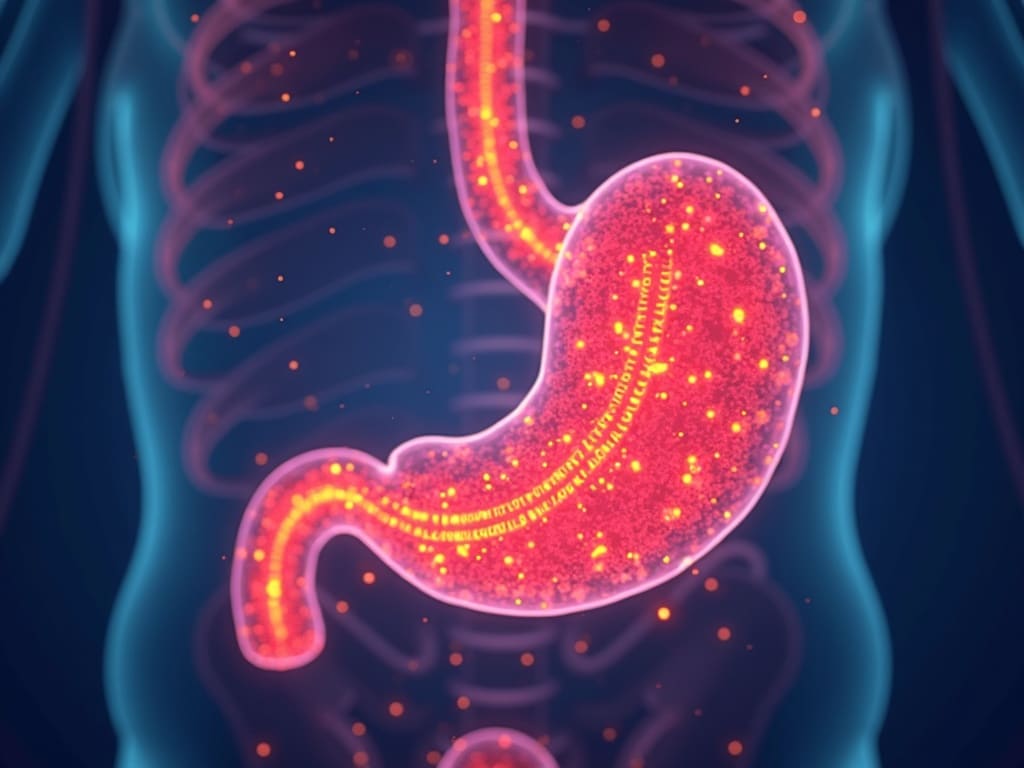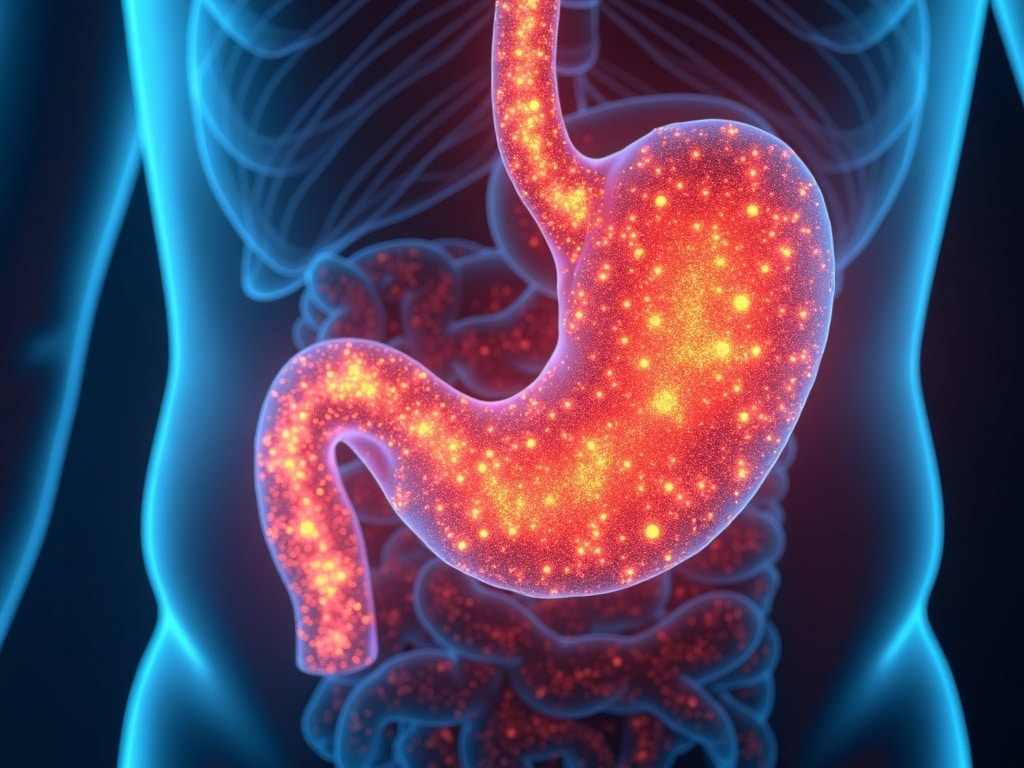Zinc Carnosine: Your Gut's Unsung Hero for Stomach Repair
Imagine your stomach lining as a bustling cityscape. Now picture tiny potholes and cracks appearing in the roads. That's similar to what happens with stomach ulcers and general gut irritation. What if there was a mini construction crew, readily available, equipped with the perfect tools to patch things up? Enter zinc carnosine, a dynamic duo that may just be the unsung hero your gut has been waiting for.
What is Zinc Carnosine? Unpacking the Power Couple
Zinc carnosine is a chelate, which is a fancy way of saying it's a compound where zinc is bound to L-carnosine. This binding is crucial because it enhances the stability of both molecules and allows them to work more effectively in the harsh environment of your stomach. Think of it as giving zinc, a vital mineral, a bodyguard (L-carnosine) to ensure it reaches its destination unharmed.
But what exactly do zinc and L-carnosine do individually?
- Zinc: We all know zinc is essential for immune function, wound healing, and overall cellular health. In the gut, it helps maintain the integrity of the mucosal lining.
- L-Carnosine: This naturally occurring dipeptide (two linked amino acids) boasts antioxidant and anti-inflammatory properties. It’s found in high concentrations in the brain and muscle tissues, but its benefits extend to the digestive system too.
The Synergistic Effect: Why the Combination Matters
Separately, zinc and L-carnosine offer benefits. Together, they are a force to be reckoned with. The carnosine helps deliver zinc directly to the stomach lining, increasing its concentration in the areas that need it most. This targeted delivery ensures prolonged action and enhanced therapeutic effects compared to zinc supplementation alone.
The Science Behind Stomach Repair: How Zinc Carnosine Works
So, how does this dynamic duo actually go about repairing the potholes in your stomach? It's a multi-pronged approach:
- Mucosal Protection: Zinc carnosine strengthens the gastric mucosal barrier, forming a protective layer against acid and other irritants. Think of it as creating a shield for your stomach lining.
- Anti-Inflammatory Action: By reducing inflammation in the gut, zinc carnosine helps soothe irritation and create a more favorable environment for healing.
- Antioxidant Properties: Free radicals can damage cells in the stomach lining, hindering the healing process. Zinc carnosine neutralizes these harmful molecules, protecting the tissue.
- Wound Healing Promotion: Studies suggest zinc carnosine accelerates the healing of gastric ulcers by promoting cell migration and tissue regeneration. It’s like sending in a construction crew to rebuild damaged areas, brick by brick.
- H. pylori Inhibition: Helicobacter pylori (H. pylori) is a common bacterial infection that can cause gastritis and ulcers. Zinc carnosine has shown promise in inhibiting the growth of this bacteria, supporting its eradication alongside conventional treatments.
Who Can Benefit From Zinc Carnosine? Identifying Potential Users
While zinc carnosine is not a magic bullet, it can be a valuable addition to a gut-healing protocol for certain individuals. Consider the following scenarios:
- Individuals with Gastritis: If you experience chronic inflammation of the stomach lining (gastritis), zinc carnosine may help reduce irritation and promote healing. Symptoms of gastritis include upper abdominal pain, nausea, and bloating.
- Those with Peptic Ulcers: Peptic ulcers are sores that develop in the lining of the stomach, esophagus, or small intestine. While conventional treatments like antibiotics and acid-reducing medications are crucial, zinc carnosine can support the healing process and protect the ulcerated area.
- People Taking NSAIDs: Nonsteroidal anti-inflammatory drugs (NSAIDs) like ibuprofen and aspirin can damage the stomach lining and increase the risk of ulcers. Zinc carnosine may help mitigate these side effects by protecting the mucosa.
- Individuals with Leaky Gut: Also known as increased intestinal permeability, leaky gut is a condition where the lining of the small intestine becomes more permeable. While more research is needed, zinc carnosine might help strengthen the gut barrier and reduce inflammation associated with this condition.
It is extremely important to consult a qualified healthcare professional before taking zinc carnosine. They can help determine if it's appropriate for your specific condition and guide you on dosage.

Choosing the Right Zinc Carnosine Supplement: What to Look For
Not all zinc carnosine supplements are created equal. To ensure you're getting a high-quality product, consider the following factors:
- Purity and Quality: Look for supplements manufactured by reputable brands that adhere to strict quality control standards. Third-party testing can further ensure purity and potency.
- Dosage: The optimal dosage of zinc carnosine varies depending on individual needs and the specific condition being addressed. A common dosage range is 75-150 mg per day, typically divided into two doses. Always follow your healthcare provider's recommendations.
- Bioavailability: Some formulations may enhance the bioavailability of zinc carnosine, meaning your body can absorb and utilize it more effectively.
- Additional Ingredients: Some supplements may contain additional ingredients like probiotics or other botanicals that support gut health.
How to Incorporate Zinc Carnosine into Your Gut-Healing Journey
Zinc carnosine is often combined with other gut-supportive strategies for optimal results. Here's how you can integrate it into your overall plan:
- Dietary Modifications: Adopt a gut-friendly diet that emphasizes whole, unprocessed foods. Focus on anti-inflammatory foods like fruits, vegetables, lean protein, and healthy fats. Avoid processed foods, sugary drinks, and excessive alcohol, as these can irritate the gut lining.
- Stress Management: Chronic stress can negatively impact gut health. Practice stress-reducing techniques like meditation, yoga, or spending time in nature.
- Probiotics and Prebiotics: Probiotics are beneficial bacteria that can help restore balance to your gut microbiome. Prebiotics are fibers that feed these beneficial bacteria. Consider incorporating both into your diet or supplement regimen.
- Other Supplements: Depending on your specific needs, other supplements like L-glutamine, digestive enzymes, or herbal remedies may be beneficial. Work with your healthcare provider to determine the right combination for you.
Potential Side Effects and Precautions
Zinc carnosine is generally considered safe for most people when taken as directed. However, some individuals may experience mild side effects such as:
- Nausea
- Stomach upset
- Constipation
These side effects are usually temporary and resolve on their own.
Warnings and Interactions
- Pregnancy and Breastfeeding: There is limited information on the safety of zinc carnosine during pregnancy and breastfeeding. Consult your healthcare provider before use.
- Zinc Deficiency: It may seem counter-intuitive, but high doses of zinc can sometimes impair copper absorption, potentially leading to copper deficiency over long periods.
- Medication Interactions: Zinc can interact with certain medications, such as some antibiotics and diuretics. Inform your healthcare provider about all medications and supplements you are taking.
The Future of Zinc Carnosine Research
While existing research is promising, ongoing studies continue to explore the full potential of zinc carnosine in supporting gut health. Future research may focus on:
- Optimizing Dosage and Delivery Methods: Researchers are investigating different formulations and delivery methods to enhance the bioavailability and targeted action of zinc carnosine.
- Exploring Applications for Other Digestive Disorders: Studies are examining the potential of zinc carnosine in managing conditions like inflammatory bowel disease (IBD) and irritable bowel syndrome (IBS).
- Investigating the Role of the Gut Microbiome: Research is exploring how zinc carnosine interacts with the gut microbiome and its impact on overall gut health.
Final Thoughts: A Promising Tool for Gut Wellness
Zinc carnosine is emerging as a valuable tool in promoting stomach repair and overall gut wellness. Its unique combination of zinc and L-carnosine offers a synergistic effect, providing mucosal protection, anti-inflammatory action, and wound-healing support. While not a standalone solution, it can be a beneficial addition to a comprehensive gut-healing strategy. As with any supplement, it's crucial to consult with a qualified healthcare professional to determine if zinc carnosine is right for you and to guide you on proper dosage and usage. By taking a holistic approach to gut health, you can pave the way for a healthier, happier digestive system.
